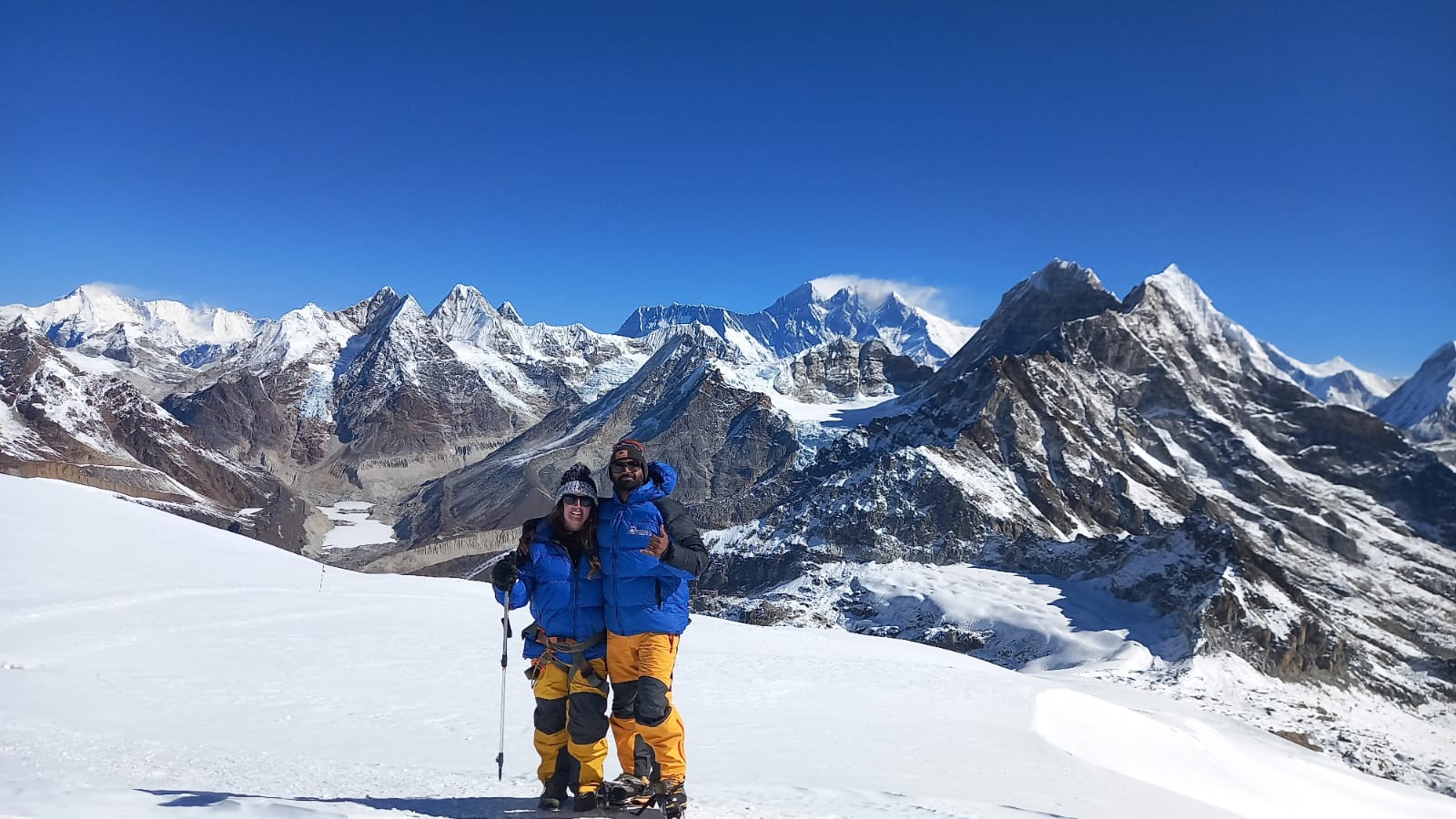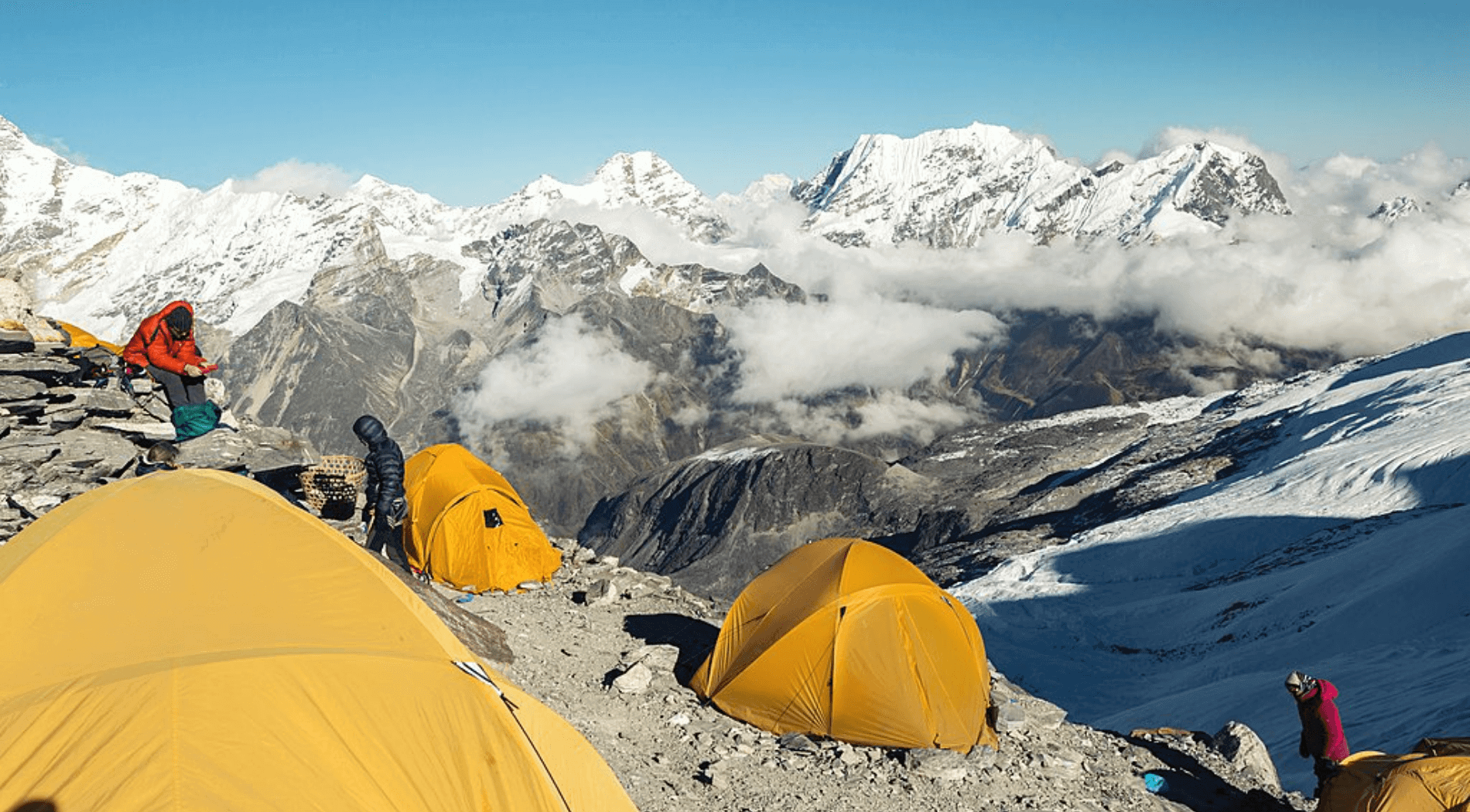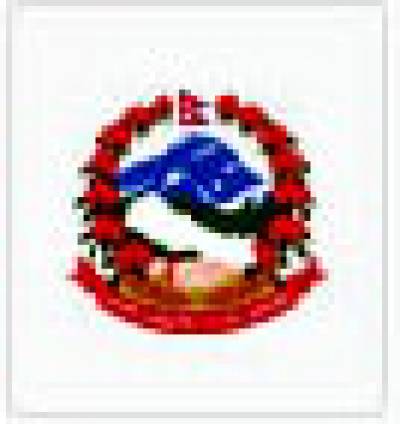MERA PEAK CLIMBING 15 DAYS
The Mera Peak Expedition is a 15-day trek that takes you through some of the most stunning landscapes and challenging trails in Nepal. Mera Peak is the highest trekking peak in Nepal, standing at 6,476 meters, and the expedition is a great challenge for adventure enthusiasts.
The trek starts with a scenic flight from Kathmandu to Lukla, followed by a trek to Paiya and Pangkongma. From there, we will head towards Ningsow and spend a day acclimatizing before continuing our trek to Chhatra Khola and Kothe.
The next day, we will trek to Thangnak, where we will spend a day acclimatizing before continuing our journey towards Khare, the last village on the trek. From Khare, we will head towards Mera Base Camp, located at 5,300 meters, and spend a day acclimatizing before ascending to Mera High Camp.
The ascent to Mera High Camp is steep and challenging, but the views from the top are stunning. The final ascent to the summit of Mera Peak takes about 7-8 hours and requires proper acclimatization and physical fitness.
The summit of Mera Peak offers panoramic views of the surrounding mountains, including Everest, Lhotse, Makalu, and Cho Oyu. After spending some time at the summit, we will descend back to Mera Base Camp and then continue our trek back to Lukla via Kothe and Paiya.
The Mera Peak Expedition is a challenging trek that requires a good level of fitness and experience in high-altitude trekking. However, it is a truly rewarding experience that will leave you with memories that will last a lifetime. The trek offers an opportunity to explore the stunning landscapes of the Himalayas, experience the local culture, and challenge yourself physically and mentally.
ITINERARY
Day 1 : Arrival in Katmandu (1,300m/4,264ft) & transfer to hotel.
A representative from Sherpa Expedition and Trekking will meet you at Tribhuvan International Airport. You will then be taken to your hotel in Thamel, the tourist hub of Kathmandu. In the evening you are invited to join our welcome dinner where you will also be briefed on what to expect on your journey to Mera Peak.
Day 2 : Fly to Lukla, trek to Paiya (Chutok) (2,730m/8,956ft) Duration: 5-6 hours.
Today we take an early morning scenic flight from Kathmandu to Lukla, the gateway to the Khumbu and Everest regions. From Lukla, we follow a trail heading east through thick forest on a hillside below the Kalo Himal Ridge. We will eventually arrive at Paiya where we will stay overnight.
Day 3 : Trek from Paiya to Pingkongma (2,846m/9,337ft) Duration: 5-6 hours.
Today descend and cross a bridge and continue on to Kari La Pass. We will pass through low shrub and bamboo forest while looking down at the Dudh Koshi Valley and river. We continue until we arrive at the farming village of Pingkongma where we will stay overnight.
Day 4 : Pangkonma to Ramailo Danda ( (3,276m / 10,748ft) Duration: 5-6 hours.
Leaving Pingkongma we head to Pingkongma La Pass and then climb up heading on a trail to the north. Along the way, we cross Peseng Kharka Khola (river) and pass Kharka Danda. We cross the Ningsow Khola (river) before arriving at Ramailo Danda Village where we will stay overnight.
Day 5 : Ramailo Danda to Chhatra Buk (2,800m/9,186ft) Duration: 7-8 hours.
From Ramailo Dandawhere we have views of Mera Peak. We then follow the trail as it heads through Makalu Barun Park. We will follow the Pasang Lhamu trail until we reach our overnight destination of Chhatra Buk.
Day 6 : Chhatra Buk To Thaknak (4,358m/14,297ft) Duration: 7-8 hours.
We follow the trail along the banks of the Hinku Khola with Mera Peak directly above. We will stop for lunch at Gondishung, a small settlement for cattle and yak grazing. We pass a 200-year-old Lungsumgba Gompa (monastery) before arriving at Thangnak where we will stay overnight.
Day 7 : Thaknak to Khare (5,045m/16,486ft) Duration: 2-3 hours.
Leaving Thagnak we head to Khare and along the trail have views of Charpate Himal. The trail ascends across moraines to the base of the Hinku Nup (valley glacier) and Shar glaciers. After reaching Khare we can see the north face of Mera Peak. We will stay here the night.
Day 8 : Khare: acclimatization and pre-climb coaching.
Today we have a day set aside to acclimatize, something that cannot be overlooked. Health professionals recommend staying active during this time. Your guide will also go over some tips on climbing to Mera Peak and the use of an ice axe, harness, ascenders, and crampons. We will stay overnight at Khare.
Day 9 : Khare to Mera High Camp (5,780m/18,958ft) Duration: 6-7 hours.
We cross a rocky terrain to reach Mera Peak Base Camp. We then continue through Mera La Pass to reach Mera High Camp. Once at High Camp, we will have some amazing views of Mt. Everest, Makalu, and Cho Oyu, Nuptse, Chamlang, and Baruntse. We will stay here overnight.
Day 10 : Mera High Camp to Summit (6,461m/21,1907ft) and back to Khare (5045m/16,547ft) Duration: 8-9 hours.
This is the big day as we head off to the summit. We will be up real early in order to reach the summit with time enough to return to High Camp and Khare. The early morning light on the snow-capped peak is stunning. From the summit, we have spectacular views of Mt. Everest (8,848m), Cho-Oyu (8,210m), Lhotse (8,516m), Makalu (8,463m), Kanchenjunga (8,586m), Nuptse (7,855m), Chamlang (7,319m), Baruntse (7,129m) and other peaks. We will then head back to Khare for the night.
Day 11 : Trek back from Khare to Kothe Duration: 4-5 hours.
After having achieved our target – the summit of Mera Peak, we will retrace our steps from Khare and pass through Thangnak before heading further towards Kothe. With mostly downhill trekking, we will leave the high altitudes and enter into the dense sub-tropical forest filled with rhododendron, oak, pine and birch trees. We trek until we arrive at Kothe.
Day 12 : Trek from Kothe to Tuli Kharka Duration: 5-6 hours.
Leaving Kothe, our trail is uphill trekking through dense rhododendron forest that goes over the western section of Hinku valley towards Tuli Kharka. Duration 6-7 hours From Tuli Kharka we can enjoy the magnificent views of Mera North, Mera Central and south face of Mera Peak.
Day 13 : Trek from Tuli Kharka to Lukla via Zatrawala Pass Duration 6-7 hours
Today is the last day of our trekking. From Tuli Kharka we will ascend for the crossing of Zatrawala Pass and from the top of the pass, we descend to finally arrive back to Lukla. In the evening, we will celebrate the successful Mera Peak Climb.
Day 14 : Flight back from Lukla to Kathmandu
We will take an early morning scenic flight from Lukla back to Kathmandu. You will be transferred to the hotel after landing at the airport. You can either have rest at hotel or visit sites that weren’t possible on the second day of the trip. Enjoy your leisure time at Kathmandu.
Day 15 : Transfer to The International airport for your final Departure.
Today, last day in amazing Nepal with great experience and fond memories of Mera Peak Climbing, as per your time for an international flight, Sherpa Expedition and Trekking member transfer you to the airport for your final departure homeward bound or to your next destinations. Breakfast Included.
SERVICES
Costs included in your package.
- Airport picks up and transports by private Car/Jeep.
- Two night’s standard twin sharing Hotel in Kathmandu with breakfast.
- Three meals a day (Breakfast, lunch, and dinner) during the trek.
- Fresh fruit every evening after dinner.
- Trekking Lodge (Tea House) during the trek and tent camp accommodation during climbing session.
- All necessary paperwork including Makalu Barun National Park Pemit Entry fees.
- Kathmandu-Lukla-Kathmandu (Ramechhap -Lukla- Ramechhap) flight with private airport transfer and domestic airport tax.
- A highly experienced, helpful, knowledgeable, friendly, English speaking well trained, Government license holder guide with all his salary, food, drinks, accommodation, transport and insurance.
- Climbing permit of Mera Peak.
- Strong, helpful Sherpa porters with proper safety equipment and walking equipment, his salary, food, accommodation, and insurance (one porter for two people).
- Comprehensive medical supplies (first aid kit will be available).
- Arrangement of emergency helicopter service (paid by your Travel Insurance Company).
- Use of sleeping bag, down jacket, duffel bag and walking poles (if you don’t have your own, to be returned after trip completed).
- Sherpa Expedition and Trekking T-shirt
- Government taxes and official expenses.
- Trip achievement certificate after successful trip completion.
- Oxygen meter to check your pulse and oxygen saturation and heart rate twice daily (Very useful to check Altitude Mountain Sickness(AMS) symptoms) which will ensure your health during the trek.
- Assistant guide for groups of 8 or more people.
Costs Exclude
- Meals whilst you are in Kathmandu - lunch, and dinner.
- Nepal entry visa fee (easy to obtain the visa on arrival at Tribhuvan International Airport – Kathmandu). $30 USD for 15-day, $50 USD for 30 Days, and $125 USD for 90 Days visa.
- Personal travel and medical insurance.
- International airfare.
- Your personal expenses.
- All the alcoholic and nonalcoholic, soup, tea, coffee, hot chocolate, cocoa, mineral water, extra food, cold and hot drinks on trek ( i.e. those you choose to purchase along the way and during evenings in the tea houses)
- All desserts & sweet things like chocolate, cake, pie, pudding.
- Hot shower and battery charging at the tea houses.
- Tips for the guide, porter, and driver (tipping is expected)
- Excess baggage of more than 10 kg for Lukla flight.
- NOTE: If you return earlier from the trek due to sickness or any problem, the money you paid for the flight, hotel, mountain room, food, etc. is nonrefundable, and you will need to bear the expenses for the hotel, food, etc. in Kathmandu yourself.
EQUIPMENTS
You will be carrying all of your gear and share some of the cluster gear. Keeping your pack light is important, so choose light-weight clothing and equipment. Be sure to have a range of clothing suitable for all conditions. Sudden change of weather may require layering of clothing. Three layers will meet your needs. Avoid cotton or fabrics that do not maintain heat when cold. Comfortable durable wool (or proven fabrics) that breathe and expel sweat lends itself to an additional pleasant experience!'
We will offer complimentary water and a windproof duffle that you'll use on the trek - carried by porters. The duffle is yours to keep once at the end of the trek. You can safely leave your bag, together with your non-trekking requirements, at our office in Katmandu and collect them upon your return.
All equipment, such as base camp tents, room accessories, climbing rope, ice screws, snow bar and ice hammer is provided by Sherpa Expedition & Trekking.
Upper Body:
- Base Layers: Moisture-wicking and quick-drying shirts and thermal tops.
- Insulation Layers: Fleece or down jackets to provide warmth.
- Waterproof Shell Jacket: A durable and breathable jacket to protect against wind and rain.
- Softshell Jacket: A lightweight and water-resistant jacket for added protection.
- Climbing Harness: A comfortable harness to secure yourself to the rope.
- Helmet: A strong and well-fitting helmet to protect your head from falling objects.
- Gloves: A combination of lightweight liner gloves and insulated gloves or mittens for warmth and dexterity.
- Buff or Neck Gaiter: To protect your neck and face from cold and wind.
- Sunglasses: Polarized and UV-protected sunglasses to shield your eyes from the sun and snow glare.
- Goggles: Ski or mountaineering goggles for added eye protection in extreme weather conditions.
Lower Body:
- Base Layers: Moisture-wicking and quick-drying thermal bottoms.
- Insulation Layers: Fleece or insulated pants for added warmth.
- Waterproof Shell Pants: Durable and breathable pants to protect against wind, rain, and snow.
- Softshell Pants: Lightweight and water-resistant pants for added protection.
- Mountaineering Boots: Sturdy and insulated boots designed for snow and ice.
- Crampons: Attachable spikes that provide traction on icy terrain.
- Gaiters: Waterproof and breathable gaiters to keep snow out of your boots.
- Socks: A combination of moisture-wicking liner socks and thick, warm mountaineering socks.
Other Essential Items:
- Backpack: A spacious and sturdy backpack to carry your climbing gear and personal belongings.
- Sleeping Bag: A warm and lightweight sleeping bag that can withstand sub-zero temperatures.
- Trekking Poles: Adjustable trekking poles for added stability and support.
- Headlamp: Essential for climbing in low-light or dark conditions.
- Water Bottles: Insulated water bottles to keep your water from freezing.
- Sunscreen: High SPF sunscreen to protect your skin from the strong sun at high altitudes.
- First Aid Kit: A comprehensive first aid kit with essential medications and supplies.
- Climbing Snacks: Energy bars, nuts, and other lightweight snacks for quick fuel during the climb.
It is important to invest in high-quality gear and ensure that everything fits properly and is in good condition. Additionally, consult with experienced climbers or a professional guide to ensure you have all the necessary gear and receive proper training on how to use it effectively and safely.
GOOD TO KNOW
Mera Peak is one of the popular trekking peaks in Nepal, standing at an elevation of 6,476 meters (21,247 feet). Here are some important details about Mera Peak climbing:
1. Location: Mera Peak is located in the Khumbu region of Nepal, in the Solu-Khumbu district. It lies in the vicinity of the Everest region.
2. Difficulty Level: Mera Peak is considered a moderately difficult climb. It requires a good level of physical fitness and previous trekking experience is recommended. Some technical climbing skills may be required, especially towards the summit.
3. Permits: As with any climbing expedition in Nepal, you will need to obtain climbing permits. For Mera Peak, you will need a climbing permit issued by the Nepal Mountaineering Association (NMA) and a Sagarmatha National Park permit.
4. Route: The most common route for Mera Peak climbing is the Mera La pass route. The journey begins with a flight from Kathmandu to Lukla, followed by a trek to Mera Peak Base Camp via various villages like Paiya, Pangkongma, and Khare. The summit push is usually made from High Camp (5,800 meters).
5. Duration: The typical duration for Mera Peak climbing is around 18-20 days, including acclimatization days and trekking to and from Lukla.
6. Accommodation: During the trek, you will stay in teahouses or lodges available in the villages along the route. However, at higher altitudes, you will need to set up tents for camping.
7. Best Time to Climb: The best time to climb Mera Peak is during the spring (March-May) and autumn (September-November) seasons. These months offer stable weather conditions and clear views of the surrounding mountains.
8. Safety: Climbing Mera Peak requires proper acclimatization and preparation. It is advised to climb with an experienced guide or join a reputable trekking agency that provides experienced guides and necessary equipment.
9. Equipment: Some essential climbing equipment required for Mera Peak climbing includes crampons, ice axe, harness, helmet, ropes, and proper clothing suitable for high altitude conditions. It is recommended to rent or buy these items in Kathmandu before starting the trek.
10. Fitness Requirements: Good physical fitness is essential for Mera Peak climbing. Regular cardio exercises, strength training, and hiking in similar terrain can help prepare your body for the climb.
Remember, Mera Peak climbing is a challenging adventure that requires proper planning, preparation, and guidance. It is always recommended to consult with experienced climbers or trekking agencies for more detailed and up-to-date information.
MAP
PHOTOS/Videos
Departures
Select a departure month
Fill out the form below and a Travel Expert will reach out to create your perfect tour.
FAQS
How difficult is Mera Peak climbing?
Mera Peak is considered a moderately difficult climb. It requires a good level of physical fitness and previous trekking experience is recommended. Some technical climbing skills may be required, especially towards the summit.
Do I need any climbing experience to climb Mera Peak?
While previous climbing experience is not mandatory, it is highly recommended to have prior trekking experience at high altitudes. Basic mountaineering skills such as using crampons, ice axe, and ropes are essential. It is advisable to climb with an experienced guide or join a reputable trekking agency that provides skilled guides.
What permits do I need for Mera Peak climbing?
You will need a climbing permit issued by the Nepal Mountaineering Association (NMA) and a Sagarmatha National Park permit. These permits can be obtained through a registered trekking agency or the NMA office in Kathmandu.
What is the best time to climb Mera Peak?
The best time to climb Mera Peak is during the spring (March-May) and autumn (September-November) seasons. These months offer stable weather conditions, clear views, and favorable climbing conditions. However, it is important to check the weather forecast before starting the climb.
How long does it take to climb Mera Peak?
The typical duration for Mera Peak climbing is around 10-20 days. This includes acclimatization days, trekking to and from Lukla, and the summit push.
What kind of accommodation is available during the climb?
During the trek, you will stay in teahouses or lodges available in the villages along the route. However, at higher altitudes, you will need to set up tents for camping. Teahouses provide basic facilities such as beds, meals, and toilets, while camping requires carrying your own camping equipment.
Is it safe to climb Mera Peak?
Climbing Mera Peak requires proper acclimatization and preparation. It is advised to climb with an experienced guide or join a reputable trekking agency that provides experienced guides and necessary equipment. Safety measures, such as regular health check-ups, proper acclimatization, and emergency evacuation plans, should be in place.
What equipment do I need for Mera Peak climbing?
Some essential climbing equipment required for Mera Peak climbing includes crampons, ice axe, harness, helmet, ropes, and proper clothing suitable for high altitude conditions. It is recommended to rent or buy these items in Kathmandu before starting the trek.
Can I climb Mera Peak solo?
While it is possible to climb Mera Peak solo, it is highly recommended to climb with an experienced guide or join a reputable trekking agency. Climbing with a guide ensures safety, proper guidance, and assistance in case of any emergencies.
Can I rent climbing equipment in Nepal?
Yes, you can rent climbing equipment in Kathmandu. There are several shops and rental agencies that provide climbing gear on a daily or weekly basis. However, it is important to check the condition and quality of the equipment before renting.
Latest Traveller’s Reviews
Travel experiences of our clients who recently returned from their trips.
100%
Based On 6 Reviews
Samuel Ben
New Zealand
November 1, 2023
An Unforgettable Adventure with Sherpa Expedition on Pisang Peak Climbing!
Our experience with Sherpa Expedition on the Pisang Peak Climbing was nothing short of amazing. The entire expedition was well-organized and executed with utmost professionalism. Our guide was incredibly knowledgeable and experienced, ensuring our safety and success throughout the climb. Highly recommended for those seeking a challenging and rewarding adventure!
Christiane Meuwissen
Canada
August 29, 2023
Cozy Teahouses and Warm Hospitality on Mera Peak Expedition
One of the highlights of our Mera Peak expedition was the comfortable and cozy teahouses provided by Sherpa Expedition. After a long day of trekking, it was a delight to relax in a warm and welcoming environment. The hospitality of the teahouse owners was exceptional, and we thoroughly enjoyed getting to know the other trekkers who were also staying there.
Rebecca Benedetti
United Kingdom
August 29, 2023
A Must-Do for Adventure Enthusiasts!
If you're looking for an exhilarating and challenging expedition, Mera Peak with Sherpa Expedition is a must-do! The entire trip was well-planned and executed, with our guide leading us through stunning landscapes and ensuring our safety at all times. The sense of accomplishment upon reaching the summit is indescribable. Highly recommended for adventure enthusiasts!
People Considering This Package Right Now Check availability
























